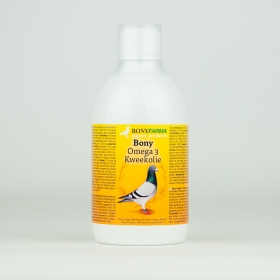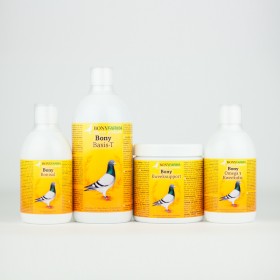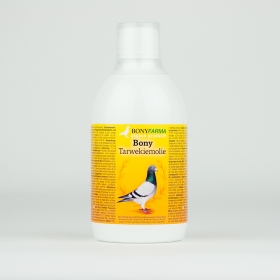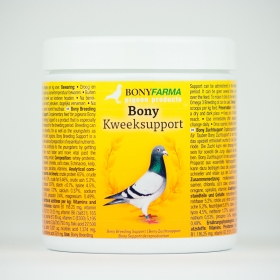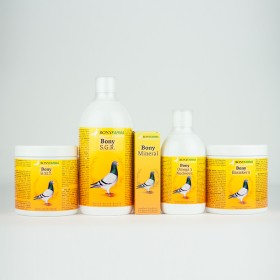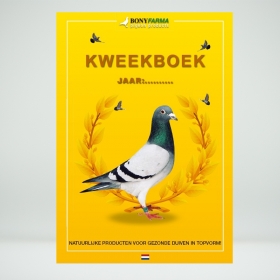Boletim Informativo Pombo, novembro de 2021
18 Novembro 2021
|
||||||||||||||
|
||||||||||||||
|
||||||||||||||
|
||||||||||||||
|
Related Products
Óleo de reprodução Omega 3 Bony - 500 ml
Óleo de reprodução Omega 3 Bony destina-se a complementar a ração diária dos pombos. Óleo de reprodução Omega 3 Bony contém óleo de linhaça prensado a frio de alta qualidade, enriquecido com óleo de peixe. O óleo de peixe é uma fonte de ácidos gordos Ómega-3 EPA e DHA. O óleo de peixe fornece por litro: EPA 16.560 mg e DHA 11.040 mg.
29,95 €
Bony Pacote de reprodução
O Bony Pacote de reprodução contém uma combinação de suplementos nutricionais de apoio especialmente selecionados para o Breeding. O Pacote de Reprodução Bony consiste em: Óleo de reprodução Omega 3 Bony, Bony Reprodução, Bony Bolectrol Plus, Bony Basis-T.
86,70 €
96,35 €
Óleo de germe de trigo Bony - 500 ml
óleo de germe de trigo Bon, à base de óleo de gérmen de trigo (Triticum aestivum), destina-se a complementar a ração diária dos pombos. Administrar durante o período de reprodução, muda e época de voo.
22,95 €
Bony Reprodução - 350 gr
Bony Reprodução destina-se a complementar a ração diária dos pombos. Contém uma combinação de matérias-primas ricas em proteínas, ingredientes vegetais, algas e aminoácidos adicionados. Adequado para uso como parte da ração durante o período de reprodução.
33,95 €
Bony Pacote Básico
O Pacote Básico é uma combinação de suplementos nutricionais de apoio que proporcionam aos pombos uma base saudável, tanto durante o crescimento como durante as épocas de muda, corrida e reprodução. Disponível como pacote básico de grande, médio e pequeno porte.
92,44 €
108,75 €
De: 92,44 €
Bony Livro de reprodução
Para se ter uma boa visão geral da criação de pombos, é importante registrar tudo sobre a criação. Que pombos devo ligar, números dos anéis, como este casal se reproduz, quais jovens vêm deste casal, números dos anéis, etc.
4,95 €







